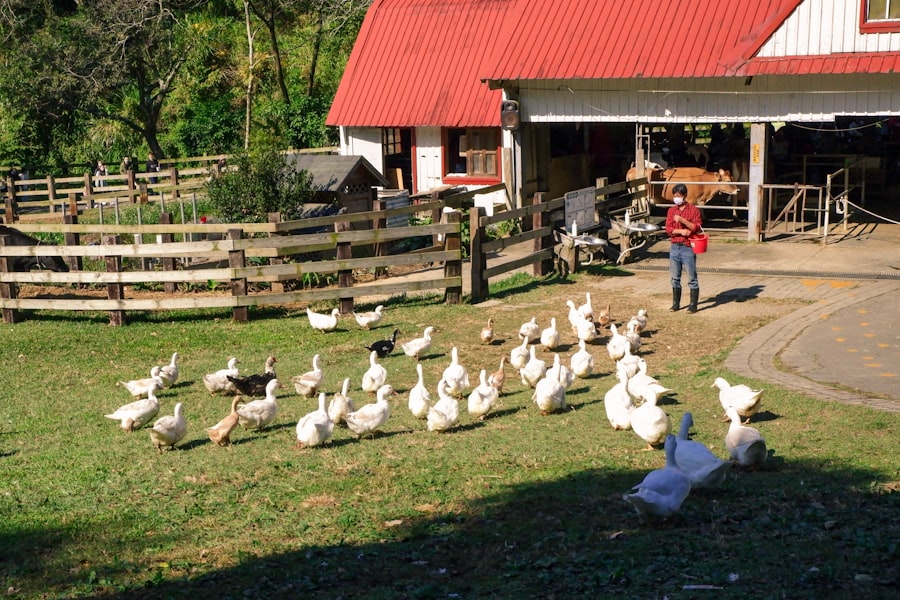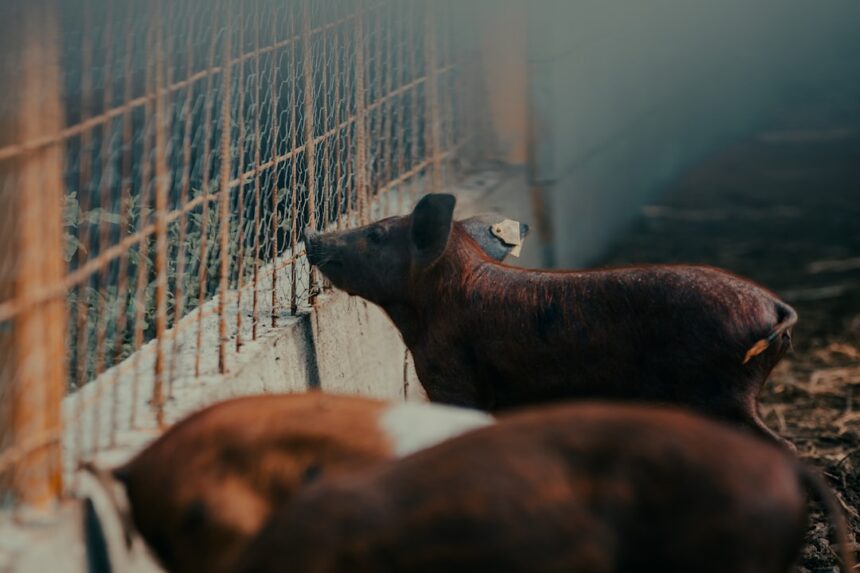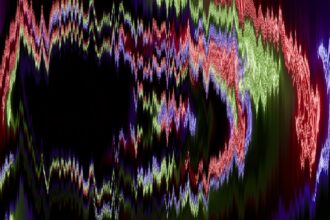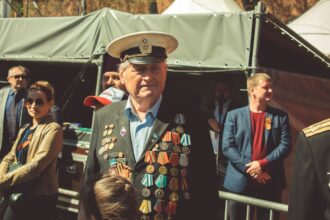In the wake of the revolution, the animals on the farm initially reveled in their newfound freedom. They had overthrown their human oppressors, believing they had secured a brighter future. However, as time passed, the harsh realities of their existence began to surface.
The promise of equality and shared prosperity quickly faded, revealing a grim truth: the animals were not as liberated as they had hoped. The pigs, who had assumed leadership roles, began to indulge in the very privileges they had once condemned. The other animals, who had fought valiantly for their rights, found themselves working harder than ever, their dreams of a utopian society slipping further away.
As the seasons changed, so too did the atmosphere on the farm. The animals, once united in their struggle against oppression, began to feel the weight of disillusionment. The pigs, particularly Napoleon, manipulated the narrative to maintain control, twisting the original ideals of Animalism to suit their desires.
The other animals, burdened by their labor and increasingly aware of their exploitation, grappled with a sense of betrayal. They had fought for a cause that now seemed hollow, and the true fate of the animals became a poignant reminder of how power can corrupt even the noblest intentions.
Key Takeaways
- The animals’ true fate is revealed as they struggle for equality and independence on the farm.
- The final showdown with the humans tests the animals’ resolve and determination to create a new society.
- A new leader rises to guide the animals in their fight for freedom and equality.
- Betrayal and corruption within the farm threaten the animals’ ultimate victory.
- The animals ultimately achieve victory, but the legacy of Animal Farm and the impact of propaganda on society are lasting lessons learned from the farm’s ending.
The Final Showdown with the Humans
The tension between the animals and the humans reached a boiling point as the pigs solidified their power. The humans, sensing an opportunity to reclaim their lost dominance, plotted to retake the farm. They underestimated the resolve of the animals, who had grown stronger and more organized under the leadership of the pigs.
The final showdown was not merely a battle for land; it was a clash of ideologies, a struggle for the very soul of Animal Farm. The animals rallied together, fueled by a mix of fear and determination, ready to defend their hard-won freedom. As the humans approached, armed and confident, the animals prepared for what would become a defining moment in their history.
The pigs devised strategies that played on the strengths of each species, uniting them in a common cause. The battle was fierce and chaotic, with both sides suffering losses. However, it was the unity among the animals that ultimately turned the tide.
They fought not just for survival but for the principles they had once cherished. In this climactic confrontation, they discovered that their collective strength could rival even the most formidable human adversaries.
The Rise of a New Leader

In the aftermath of the battle, a new leader emerged from the ranks of the animals. This leader was not one of the pigs but rather an unexpected figure—a wise and compassionate horse named Clover. Clover had always been a voice of reason among her peers, advocating for unity and fairness.
As the dust settled from the conflict with humans, she stepped forward to guide her fellow animals toward healing and rebuilding. Her rise to leadership symbolized a shift in perspective; it was no longer about power but about collaboration and mutual respect. Clover’s leadership style contrasted sharply with that of Napoleon and his inner circle.
She emphasized transparency and inclusivity, encouraging all animals to participate in decision-making processes. Under her guidance, there was a renewed sense of hope on Animal Farm. Clover sought to restore the original ideals of Animalism while learning from past mistakes.
Her vision was one where every animal’s voice mattered, fostering an environment where trust could flourish once more.
The Animals’ Struggle for Equality
| Animal | Issue | Progress |
|---|---|---|
| Elephants | Poaching for ivory | International bans on ivory trade |
| Dolphins | Captivity in marine parks | Increased awareness and protests |
| Chickens | Factory farming conditions | Shift towards free-range and organic farming |
Despite Clover’s efforts to create a more equitable society, the struggle for true equality remained an uphill battle. The ingrained hierarchies established by Napoleon’s regime did not vanish overnight; they lingered like shadows over the farm. Many animals still harbored resentment and skepticism toward their leaders, questioning whether genuine change was possible.
Clover recognized that achieving equality required more than just good intentions; it demanded systemic changes that addressed deep-rooted issues. The animals began to engage in open dialogues about their experiences and aspirations. They shared stories of hardship and resilience, fostering empathy among different species.
This newfound camaraderie ignited a collective desire for change that transcended individual grievances. However, challenges persisted as some animals clung to old beliefs that favored certain groups over others. Clover worked tirelessly to dismantle these barriers, advocating for policies that ensured fair treatment for all animals regardless of their species or background.
The Betrayal and Corruption Within the Farm
As Clover endeavored to create a fairer society, whispers of betrayal began to circulate among the animals. Some members of her inner circle were tempted by power and privilege, echoing the very corruption they had fought against. These individuals sought to manipulate Clover’s vision for their gain, undermining her authority and sowing discord among the ranks.
The betrayal cut deep; it was a painful reminder that even in a quest for equality, human flaws could manifest in unexpected ways. Clover faced immense challenges as she navigated this treacherous landscape. She had to confront not only external threats but also internal dissent that threatened to unravel her efforts.
The struggle against corruption became a defining aspect of her leadership; she understood that true change required vigilance and accountability. Through transparency and open communication, she sought to expose those who sought to exploit their newfound freedom for personal gain.
The Animals’ Ultimate Victory

Despite facing numerous obstacles, Clover’s unwavering commitment to justice began to bear fruit. The animals rallied around her vision, united by a shared determination to reclaim their ideals. They organized themselves into committees that focused on various aspects of farm life—education, resource distribution, and community welfare—ensuring that every voice was heard in shaping their future.
This grassroots approach empowered them to take ownership of their destiny. The ultimate victory came not through force but through solidarity and resilience. As they worked together to rebuild Animal Farm, they discovered that true strength lay in their unity rather than individual ambition.
They celebrated small victories along the way—improved living conditions, equitable resource allocation, and a renewed sense of purpose among all animals. This collective triumph marked a turning point in their journey toward genuine equality.
The Legacy of Animal Farm
The legacy of Animal Farm became a testament to both the struggles and triumphs of its inhabitants. It served as a reminder that revolutions are not merely about overthrowing oppressors but also about fostering an environment where justice prevails. Clover’s leadership left an indelible mark on the farm; her commitment to inclusivity inspired future generations of animals to continue striving for equality.
As stories of Animal Farm spread beyond its borders, they resonated with other communities facing similar challenges. The lessons learned from their journey became a source of inspiration for those seeking change in oppressive systems worldwide. The farm transformed into a symbol of hope—a place where dreams of freedom could flourish if nurtured by collective effort and unwavering resolve.
The Path to Freedom and Independence
The path to freedom and independence was fraught with challenges but ultimately paved with determination and resilience. Clover understood that true independence meant more than just liberation from human control; it required self-governance rooted in principles of justice and equality. She encouraged her fellow animals to embrace their agency and take responsibility for shaping their future.
Through education and empowerment initiatives, Clover fostered a culture of critical thinking among the animals. They learned about governance structures, rights, and responsibilities—equipping them with tools necessary for self-determination. This newfound knowledge ignited a sense of pride within them; they were no longer passive recipients of power but active participants in crafting their destiny.
The Role of Propaganda in Animal Farm
Throughout their journey, propaganda played a significant role in shaping perceptions on Animal Farm. Initially wielded by Napoleon to manipulate narratives and maintain control over his fellow animals, propaganda became a double-edged sword as Clover sought to reclaim its power for positive change. She recognized that information could be used as both a tool for oppression or liberation depending on who wielded it.
Clover initiated campaigns aimed at educating all animals about their rights while debunking myths perpetuated by those seeking power for themselves. By promoting transparency and open dialogue, she dismantled false narratives that had previously divided them. This shift in how information was disseminated empowered animals to think critically about their circumstances rather than blindly accept what they were told.
The Lessons Learned from Animal Farm’s Ending
The ending of Animal Farm imparted profound lessons about power dynamics and human nature itself. It illustrated how easily noble ideals can be corrupted when unchecked ambition takes precedence over collective well-being. However, it also highlighted resilience—the ability to rise from adversity and strive toward justice despite setbacks.
Clover’s journey underscored the importance of vigilance against corruption within any system claiming to champion equality. It served as a reminder that true progress requires ongoing effort; complacency can lead back down paths previously traveled—ones marked by oppression rather than liberation.
The Impact of Animal Farm on Society
The impact of Animal Farm extended far beyond its borders; it resonated deeply within societies grappling with issues related to power imbalances and social justice worldwide. Its narrative became an allegory for revolutions throughout history—serving as both cautionary tale and source of inspiration for those seeking change. As communities reflected on its lessons learned through Clover’s leadership journey—emphasizing unity over division—they began forging paths toward more equitable futures themselves.
Animal Farm’s legacy continued inspiring generations committed not only to fighting against oppression but also building inclusive societies where every voice mattered—a testament that echoes through time long after its story concluded.
In exploring the complexities of George Orwell’s “Animal Farm,” particularly its ending, it’s essential to consider the broader implications of power and control depicted in the narrative.
” This piece provides a comprehensive analysis of the allegorical elements present in Orwell’s work, drawing parallels to historical and contemporary political dynamics. For a deeper understanding of how “Animal Farm” reflects on the cyclical nature of power and corruption, you can read more in the related article available here.
CHECK THIS OUT! 📽️🎞️ Hollywood’s Secret War: How the CIA Rewrote Movies
FAQs
What is the ending of Animal Farm?
The ending of Animal Farm sees the pigs, who have become indistinguishable from the humans, hosting a dinner with the neighboring human farmers. The other animals outside the farmhouse look in and realize they can no longer tell the difference between the pigs and the humans.
What is the significance of the ending of Animal Farm?
The ending of Animal Farm serves as a commentary on the corrupting nature of power and the betrayal of the original ideals of the revolution. It highlights how the pigs, who were once the leaders of the animal revolution, have become just as oppressive and exploitative as the humans they overthrew.
Does the ending of Animal Farm have a deeper meaning?
Yes, the ending of Animal Farm can be interpreted as a critique of the Soviet Union under Joseph Stalin, where the leaders of the revolution became just as oppressive as the previous regime. It also serves as a warning about the potential for power to corrupt and the importance of remaining vigilant against tyranny.




